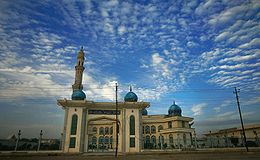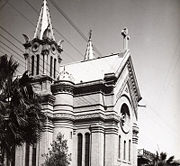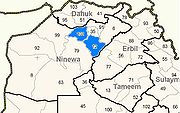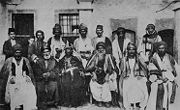
Religion in Iraq
Encyclopedia

Iraq
Iraq ; officially the Republic of Iraq is a country in Western Asia spanning most of the northwestern end of the Zagros mountain range, the eastern part of the Syrian Desert and the northern part of the Arabian Desert....
is Islam
Islam
Islam . The most common are and . : Arabic pronunciation varies regionally. The first vowel ranges from ~~. The second vowel ranges from ~~~...
, followed by about 95% of Iraqis, although more recent poll results seem to contradict these numbers. The other 5% consist of those following Christianity
Christianity
Christianity is a monotheistic religion based on the life and teachings of Jesus as presented in canonical gospels and other New Testament writings...
and other religions. Many cities throughout Iraq have been areas of historical prominence for both Shia and Sunni Muslims including Najaf
Najaf
Najaf is a city in Iraq about 160 km south of Baghdad. Its estimated population in 2008 is 560,000 people. It is the capital of Najaf Governorate...
, Karbala
Karbala
Karbala is a city in Iraq, located about southwest of Baghdad. Karbala is the capital of Karbala Governorate, and has an estimated population of 572,300 people ....
, Baghdad
Baghdad
Baghdad is the capital of Iraq, as well as the coterminous Baghdad Governorate. The population of Baghdad in 2011 is approximately 7,216,040...
and Samarra
Samarra
Sāmarrā is a city in Iraq. It stands on the east bank of the Tigris in the Salah ad-Din Governorate, north of Baghdad and, in 2003, had an estimated population of 348,700....
.
Islam in Iraq
Iraq's Muslims follow two distinct traditions, Shia and Sunni Islam. According to the CIA World FactbookThe World Factbook
The World Factbook is a reference resource produced by the Central Intelligence Agency of the United States with almanac-style information about the countries of the world. The official paper copy version is available from the National Technical Information Service and the Government Printing Office...
, Iraq is 97% Muslim (60-65% Shi'a, 32-37% Sunni). In the most recent poll released in April 2011 by AKNews asking Iraqi Citizens whether they believe in God, 67% answered "yes", 21% answered "probably yes", 4% answered "probably no", and 7% answered "no". Iraq is home to many religious sites important for both Shia and Sunni Muslims. Baghdad
Baghdad
Baghdad is the capital of Iraq, as well as the coterminous Baghdad Governorate. The population of Baghdad in 2011 is approximately 7,216,040...
was a hub of Islamic learning
Learning
Learning is acquiring new or modifying existing knowledge, behaviors, skills, values, or preferences and may involve synthesizing different types of information. The ability to learn is possessed by humans, animals and some machines. Progress over time tends to follow learning curves.Human learning...
and scholarship
Scholarship
A scholarship is an award of financial aid for a student to further education. Scholarships are awarded on various criteria usually reflecting the values and purposes of the donor or founder of the award.-Types:...
for centuries and served as the capital of the Abassids. The city of Karbala
Karbala
Karbala is a city in Iraq, located about southwest of Baghdad. Karbala is the capital of Karbala Governorate, and has an estimated population of 572,300 people ....
has substantial prominence in Shia Islam as a result of the Battle of Karbala
Battle of Karbala
The Battle of Karbala took place on Muharram 10, in the year 61 of the Islamic calendar in Karbala, in present day Iraq. On one side of the highly uneven battle were a small group of supporters and relatives of Muhammad's grandson Husain ibn Ali, and on the other was a large military detachment...
, fought on the site of the modern city on October 10, 680. Similarly, Najaf
Najaf
Najaf is a city in Iraq about 160 km south of Baghdad. Its estimated population in 2008 is 560,000 people. It is the capital of Najaf Governorate...
is renowned as the site of the tomb of Alī ibn Abī Tālib
Ali
' |Ramaḍān]], 40 AH; approximately October 23, 598 or 600 or March 17, 599 – January 27, 661).His father's name was Abu Talib. Ali was also the cousin and son-in-law of the Islamic prophet Muhammad, and ruled over the Islamic Caliphate from 656 to 661, and was the first male convert to Islam...
(also known as "Imām Alī"), whom the Shia consider to be the righteous caliph and first imām
Imam
An imam is an Islamic leadership position, often the worship leader of a mosque and the Muslim community. Similar to spiritual leaders, the imam is the one who leads Islamic worship services. More often, the community turns to the mosque imam if they have a religious question...
. The city is now a great center of pilgrimage
Pilgrimage
A pilgrimage is a journey or search of great moral or spiritual significance. Typically, it is a journey to a shrine or other location of importance to a person's beliefs and faith...
from throughout the Shi'a Islam
Islam
Islam . The most common are and . : Arabic pronunciation varies regionally. The first vowel ranges from ~~. The second vowel ranges from ~~~...
ic world and it is estimated that only Mecca
Mecca
Mecca is a city in the Hijaz and the capital of Makkah province in Saudi Arabia. The city is located inland from Jeddah in a narrow valley at a height of above sea level...
and Medina
Medina
Medina , or ; also transliterated as Madinah, or madinat al-nabi "the city of the prophet") is a city in the Hejaz region of western Saudi Arabia, and serves as the capital of the Al Madinah Province. It is the second holiest city in Islam, and the burial place of the Islamic Prophet Muhammad, and...
receive more Muslim pilgrims. The city of Kufa
Kufa
Kufa is a city in Iraq, about south of Baghdad, and northeast of Najaf. It is located on the banks of the Euphrates River. The estimated population in 2003 was 110,000....
was home to the famed scholar, Abu Hanifah whose school of thought is followed by a sizable number of Sunni Muslims across the globe. Likewise, Samarra
Samarra
Sāmarrā is a city in Iraq. It stands on the east bank of the Tigris in the Salah ad-Din Governorate, north of Baghdad and, in 2003, had an estimated population of 348,700....
is also home to the al-Askari Mosque
Al-Askari Mosque
Al ‘Askarī Mosque or the ‘Askariyya Mosque/Shrine is a Shī‘ah Muslim holy site located in the Iraqi city of Sāmarrā from Baghdad. It is one of the most important Shī‘ah mosques in the world, built in 944...
, containing the mausoleums of the Ali al-Hadi
Ali al-Hadi
‘Alī al-Hādī , also known as ‘Alī an-Naqī was the tenth of the Twelve Imams. His full name is ‘Alī ibn Muhammad ibn ‘Alī. The exact date of his birth and death are unknown, but it is generally accepted that he was born between 827–830 CE and he died in 868 CE.- Early years :‘Alī al-Hādī was born...
and Hasan al-Askari
Hasan al-Askari
Hasan al-‘Askarī was the eleventh of the Twelve Imams. His given name was Hasan ibn ‘Alī ibn Muhammad...
, the tenth and eleventh Shia Imams, respectively, as well as the shrine of Muhammad al-Mahdi
Muhammad al-Mahdi
Muḥammad ibn al-Ḥasan al-Mahdī is believed by Twelver Shī‘a Muslims to be the Mahdī, an ultimate savior of humankind and the final Imām of the Twelve Imams...
, known as the "Hidden Imam", who is the twelfth and final Imam of the Shia of the Ja'farī Madhhab. This has made it an important pilgrimage centre for Ja'farī Shia Muslims. In addition, some female relatives of the Prophet Mohammad are buried in Samarra, making the city one of the most significant sites of worship for Shia and a venerated location for Sunni Muslims.
Smaller sects of Islam exist in the country, such as the small Shaykhist
Shaykhism
Shaykhism is an Islamic religious movement founded by Shaykh Ahmad in early 19th century Qajar Iran. It began from a combination of Sufi and Shi‘a doctrines of the end times and the day of resurrection. Today the Shaykhi populations retain a minority following in Iran and Iraq...
community concentrated in Basra
Basra
Basra is the capital of Basra Governorate, in southern Iraq near Kuwait and Iran. It had an estimated population of two million as of 2009...
and Karbala
Karbala
Karbala is a city in Iraq, located about southwest of Baghdad. Karbala is the capital of Karbala Governorate, and has an estimated population of 572,300 people ....
.
Christianity



Christianty was brought to Iraq in the first century by the Apostle Thomas, Addai (Thaddaeus) and his pupils Aggagi and Mari. Thomas and Thaddeus belonged to the twelve Apostles. Iraq's Syriac Christian
Syriac Christianity
Syriac or Syrian Christianity , the Syriac-speaking Christians of Mesopotamia, comprises multiple Christian traditions of Eastern Christianity. With a history going back to the 1st Century AD, in modern times it is represented by denominations primarily in the Middle East and in Kerala, India....
minority represents roughly 3% of the population, mostly living in Northern Iraq, concentrated in the Ninewa and Dahuk governorates. There are no official statistics, and estimates vary greatly. In 1950 Christians numbered 7-10% of the population of 5.5 million. Since the 2003 Iraq war, Iraqi Christians have been dislocated to Syria
Syria
Syria , officially the Syrian Arab Republic , is a country in Western Asia, bordering Lebanon and the Mediterranean Sea to the West, Turkey to the north, Iraq to the east, Jordan to the south, and Israel to the southwest....
in significant but unknown numbers. Iraqi Christians are divided into three church bodies:
- "Chaldeans" (Chaldean Catholic ChurchChaldean Catholic ChurchThe Chaldean Catholic Church , is an Eastern Syriac particular church of the Catholic Church, maintaining full communion with the Bishop of Rome and the rest of the Catholic Church...
) - "Assyrians" or "Nestorian" group (Assyrian Church of the EastAssyrian Church of the EastThe Assyrian Church of the East, officially the Holy Apostolic Catholic Assyrian Church of the East ʻIttā Qaddishtā w-Shlikhāitā Qattoliqi d-Madnĕkhā d-Āturāyē), is a Syriac Church historically centered in Mesopotamia. It is one of the churches that claim continuity with the historical...
and Ancient Church of the EastAncient Church of the EastThe Ancient Church of the East was established in 1968. It follows the traditions of one of the oldest Christian churches, the Church of the East, whose origins trace back to the See of Seleucia-Ctesiphon in central Mesopotamia...
) - "West Syriac" or "Jacobite" group (Syriac Orthodox ChurchSyriac Orthodox ChurchThe Syriac Orthodox Church; is an autocephalous Oriental Orthodox church based in the Eastern Mediterranean, with members spread throughout the world. The Syriac Orthodox Church claims to derive its origin from one of the first Christian communities, established in Antioch by the Apostle St....
and Syriac Catholic ChurchSyriac Catholic ChurchThe Syriac Catholic Church is a Christian church in the Levant having practices and rites in common with the Syriac Orthodox Church. They are one of the Eastern Catholic Churches following the Antiochene rite, the Syriac tradition of Antioch, along with the Maronites and Syro-Malankara Christians...
)
Yazidi
The YazidiYazidi
The Yazidi are members of a Kurdish religion with ancient Indo-Iranian roots. They are primarily a Kurdish-speaking people living in the Mosul region of northern Iraq, with additional communities in Transcaucasia, Armenia, Turkey, and Syria in decline since the 1990s – their members emigrating to...
live near Mosul
Mosul
Mosul , is a city in northern Iraq and the capital of the Ninawa Governorate, some northwest of Baghdad. The original city stands on the west bank of the Tigris River, opposite the ancient Assyrian city of Nineveh on the east bank, but the metropolitan area has now grown to encompass substantial...
and are made up of ethnic Kurds. Yazidism dates to pre-Islamic times and Mosul is the principal holy site of the Yazidi faith. The holiest Yazidi shrine is that of Sheikh Adi located at the necropolis
Necropolis
A necropolis is a large cemetery or burial ground, usually including structural tombs. The word comes from the Greek νεκρόπολις - nekropolis, literally meaning "city of the dead"...
of Lalish
Lalish
Lalish is a small mountain valley situated in northern Iraq about 60 km northwest of the city of Mosul. It is the location of the tomb of Şêx Adî, main figure of the Yazidi faith....
.
Mandaeism
The Mandaean faith has existed in Iraq since the reign of Artabanus V of Parthia according to the Haran Gawaitha (secret wanderings) scroll of secondary Mandaean writ. This would make the Iraqi presence of Mandaeans at least 1,800 years old, making it the third oldest continually professed faith in Iraqi society after Zoroastrianism and Judaism. There are more Mandaeans in Iraq than there are Zoroastrians or Jews combined. In Iraq estimates of around 60,000 have been made. The oldest independent confirmation of Mandaean existence in the region is the Kartir inscription. The Mandaean faith is commonly known as the last surviving Gnostic faith and its adherents believe it to be the oldest faith on Earth, with at least some scholarly support for it being as old if not older than Christianity perhaps even being a major influence in the development of heterodox Jewish circles which eventually led to the formation of Christian beliefs, practices, rituals and theology. John the BaptistJohn the Baptist
John the Baptist was an itinerant preacher and a major religious figure mentioned in the Canonical gospels. He is described in the Gospel of Luke as a relative of Jesus, who led a movement of baptism at the Jordan River...
or Yahia Yuhanna is considered to have been the final Mandaean prophet and first true Ris'Amma, or Ethnarch, of the Mandaean people. Most Iraqi Mandaeans live near waterways because of the practice of total immersion (or baptism) in flowing water every Sunday. The highest concentrations are in the Mesene province with headquarters in Amarah
Amarah
Amarah , is a city in southeastern Iraq, located on a low ridge next to the Tigris River waterway south of Baghdad about 50 km from the border with Iran. It lies at the northern tip of the marshlands between the Tigris and Euphrates....
, Qalat Saleh and Basra
Basra
Basra is the capital of Basra Governorate, in southern Iraq near Kuwait and Iran. It had an estimated population of two million as of 2009...
. Besides these southern regions bordering Kuzistan in Iran, large numbers of Mandaeans can be found in Baghdad in the Dweller's Quarters, giving them easy access to the Tigris River.
Judaism
JudaismJudaism
Judaism ) is the "religion, philosophy, and way of life" of the Jewish people...
first came to Iraq
Iraq
Iraq ; officially the Republic of Iraq is a country in Western Asia spanning most of the northwestern end of the Zagros mountain range, the eastern part of the Syrian Desert and the northern part of the Arabian Desert....
under the rule of the Babylon
Babylon
Babylon was an Akkadian city-state of ancient Mesopotamia, the remains of which are found in present-day Al Hillah, Babil Province, Iraq, about 85 kilometers south of Baghdad...
ian king
Monarch
A monarch is the person who heads a monarchy. This is a form of government in which a state or polity is ruled or controlled by an individual who typically inherits the throne by birth and occasionally rules for life or until abdication...
Nebuchadnezzar II of Babylon. It was a part of the Babylonian Captivity
Babylonian captivity
The Babylonian captivity was the period in Jewish history during which the Jews of the ancient Kingdom of Judah were captives in Babylon—conventionally 587–538 BCE....
. The majority have fled, largely to Israel
Israel
The State of Israel is a parliamentary republic located in the Middle East, along the eastern shore of the Mediterranean Sea...
. Fewer than 100 Jews remain in Iraq.
Zoroastrianism
ZoroastrianismZoroastrianism
Zoroastrianism is a religion and philosophy based on the teachings of prophet Zoroaster and was formerly among the world's largest religions. It was probably founded some time before the 6th century BCE in Greater Iran.In Zoroastrianism, the Creator Ahura Mazda is all good, and no evil...
first came to Iraq
Iraq
Iraq ; officially the Republic of Iraq is a country in Western Asia spanning most of the northwestern end of the Zagros mountain range, the eastern part of the Syrian Desert and the northern part of the Arabian Desert....
when Babylon
Babylon
Babylon was an Akkadian city-state of ancient Mesopotamia, the remains of which are found in present-day Al Hillah, Babil Province, Iraq, about 85 kilometers south of Baghdad...
was conquered by the Persian Empire. Zoroastrianism in Iraq declined after the fall of the Sassanid Empire
Sassanid Empire
The Sassanid Empire , known to its inhabitants as Ērānshahr and Ērān in Middle Persian and resulting in the New Persian terms Iranshahr and Iran , was the last pre-Islamic Persian Empire, ruled by the Sasanian Dynasty from 224 to 651...
and very few, if any, Zoroastrians remain.

